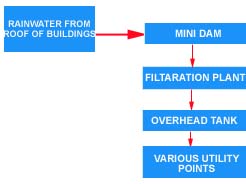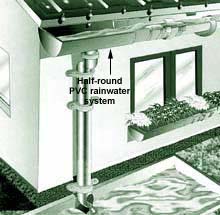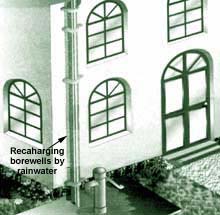
Vol. 2
No.
5
October 2000
|

Ashram
has ashray for water also
| The rain water from the foof
is channeled through undergroud pipe lines to the dam. A filteration plant purifies the
water and pumps into storage tanks for use at various locations of the ashram |
 |
Karuna Sudhajalam (divine
water) sounds good and works well. It is a rainwater harvesting system and a Housing and
Urban Development Corporation Limited (HUDCO) assisted project, implemented by Santhigiri
Ashram, Trivendrum in Kerala. Guru Shri Brahmashree Karunakara founder of the Santhigri
Ashram first desired to implement a system to harvest rainwater because the ashramm has an
ever increasing numbers of devotees visiting the campus and the existing water sources
were inadequate to meet the rising demand. So the ashram had no other option than to adopt
water harvesting for augmenting the water availability. Secondly, Kerala is facing acute
shortage of water due to indiscriminate use, poor management and immense growth of
construction activities.
Thus, with the financial and technical assistance
by HUDCO, Thiruvananthapuram, the ashram can now annually harvest about 50,000 liters of
water.
Rainwater storage scheme |
| Total roof area |
3.14 m diameter X 9 m height |
| Area available for storage |
5,000 cum |
| Capacity of storage |
50,00,000 liters (5000 cum X 1000 liters/cum) or 5 million
litres |
Technical Details of the Mini Dam |
| Capacity |
5 million liters |
| Frequency of storage |
Thrice a year |
| Storage period |
Total 81/2 months |
A quarry in front of the ashram has been
utilised to construct a mini dam to harvest rainwater. The rainwater from the roof is
channeled through underground pipelines to the dam. To purify the water a filtration plant
is installed and pumps are used to elevate water to storage tanks for various locations of
the ashram. The total roof area of the premises is 8,000 cubic metre (cum) and the area
available for storage is 5,000 cum. If 1,000 liters per cum is the storage capacity than
about 5 million liters of water can be harvested annually in the mini dam. It is the
success of the system that now the ashram can save Rs 10 lakh per year for its
water requirement at the rate Rs 0.10 per litre fromexternal sources. The ashram requires
1 lakh litres of water per day.
The total expenditure behind this achievement is
Rs 54.50 lakhs for the construction of rainwater storage tank, pipeline, delivery
arrangements with filtration plant and contingencies. While HUDCO contributed about 70 per
cent of the total project cost, the rest was contributed by the ashram.The entire
project expenditure will be recovered in the longer run through savings, which previously
was being diverted towards procuring water for the ashram. This system is useful
for premises with large campus and more water demand.
Salient features of the
system:
 Direct saving of Rs 10 lakhper annum on water expenses. Direct saving of Rs 10 lakhper annum on water expenses.
 A quarry infront of the ashram has
been converted for constructing a mini - dam to harvest rainwater. A quarry infront of the ashram has
been converted for constructing a mini - dam to harvest rainwater.
For further
information:
Santhigiri Ashram, Koliyacode P.O.
Thiruvananthapuram, Kerala–695 607.
Phone (0471) 419313 / 419056
E-mail: santhigiri@vsnl.com |
Mr. V V Krishnarajan, Assistant Chief
(Projects), HUDCO
KSHB Commercial-cum-Residential
Complex, Pattom Junction
Thiruvananthapuram- 695 004
Fax : 0471–42134 |

The half-round PVC rainwater system
 |
| Rooftop rainwater collection: Using
half round PVC rainwater system |
 |
| Ground water recharge using PVC half round
rainwater collection system |
Azad Barish PLast Ltd, a Mumbai based company has
introduced the half round PVC rainwater systems for efficient rainwater harvesting. It is
a system which is designed for the efficient disposal or harvesting of rainwater from all
low and high rise domestic buildings and sheds. This system has an effective way to
harvest rainwater as it has standardised sections, like the halfround channel in the range
of 180 mm and 140 mm to collect rainwater draining from roof or slopes. These are
connected to pipes, which transport the rainwater to a storage tank or otherwise to a
borewell in case of recharging purposes.
The system comprises a wide range of socket
fittings for use with plain-ended pipe. In addition there is a range of fittings for
connection to other materials. The system can be specified for use in the building,
industry, combining the rainwater harvesting design with PVC (polyvinyl chloride) plastic
moulding. These systems can be customised or installed to recharge bore wells to avoid
scarcity of water during dry seasons also.
In this system few essential steps have been
taken to provide maximum collection and minimum overflow. These systems are designed to a
rainfall intensity of 75 mm/hour, so that the overflow will not cause damage within the
building.
The advantages of this system:
 It has high dimensional standard, which
gives leakproof joints; It has high dimensional standard, which
gives leakproof joints;
 For channelising the water, PVC pipes are
used therefore no galvanic action occurs due to corrosion resistance: and, For channelising the water, PVC pipes are
used therefore no galvanic action occurs due to corrosion resistance: and,
 It has good flow properties compared to GI
(galvanised iron) and asbestos cement systems and the rubber ring seal jointing provides
cushioning during in change in climatic conditions. It has good flow properties compared to GI
(galvanised iron) and asbestos cement systems and the rubber ring seal jointing provides
cushioning during in change in climatic conditions.
For further information contact:
Azad Barish Plast
Mehta Estate
Near German Remedies,
Chakala, Andheri (E)
Mumbai–93.
Tel: 022–8212223/837
Fax: 022-835 6859
E-mail: azadbarish@vsnl.com
Website: www.azadbarish.com
|